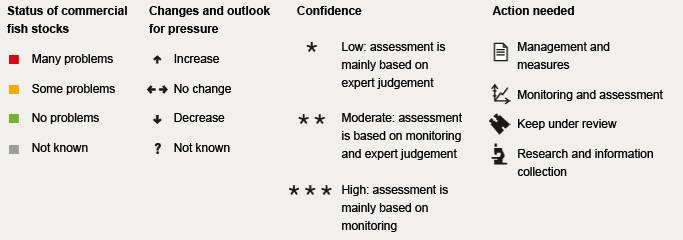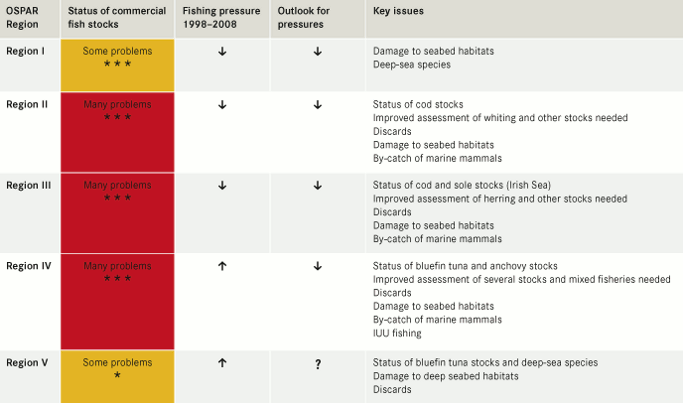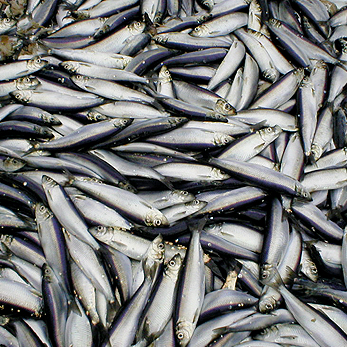
What happens next?
Further efforts are needed to address the many problems that remain
Since the QSR 2000, the fishing industry, governments and marine organisations have made considerable efforts to move towards a sustainable fishing industry, both at a local scale and at an OSPAR-wide scale. Improved fisheries management for some stocks has resulted in improvements in spawning stock biomass (SSB) and lower fishing mortality for some stocks, especially in Regions I and II. Nevertheless, commercial fishing is still exploiting stocks that are outside precautionary limits for SSB and there has been little or no change in the number of stocks whose status cannot be assessed due to poor data. Fishing mortality continues to exert excessive pressure on marine ecosystems through the removal of non-commercial species, discards and physical disturbance of the seabed. In the North Sea, the size composition of fish communities has improved, but still remains below the target value set by the North Sea EcoQO.
OSPAR is committed to supporting improvements in fisheries management
Fisheries management must continue to improve. This can only be achieved through continued cooperation between the regulatory bodies, advisory organisations, the fishing industry and other stakeholders. OSPAR is committed to promoting and facilitating cooperation between itself and the competent authorities for fisheries management in the OSPAR area, namely, the EU, NEAFC, ICCAT, the Faroe Islands, Greenland, Iceland, Norway, and the Russian Federation. This will include sharing information and work towards each organisation’s respective aims. These aims will then become more closely related through the use of an ecosystem-based approach to management, including fisheries.
OSPAR and OSPAR countries should cooperate with the relevant fisheries management authorities with the following aims:
- Promote further the mutual integration of fisheries management with ecosystem-based management of the North-East Atlantic by its implementation being made compatible with the broader integrated management tools also applicable to a wider set of human activities in the OSPAR area.
- Promote consistency, where applicable, between current EU, Faroese, Greenlandic, Icelandic, Norwegian and Russian Federation fisheries legislation and long-term management plans with OSPAR EcoQOs and the developing descriptors of good environmental status under the EU Marine Strategy Framework Directive.
- Ensure that fisheries are managed in a sustainable manner in the context of the EU Common Fisheries Policy, so as to underpin OSPAR’s long-term aims for protecting and conserving biodiversity and ecosystem functioning in the North-East Atlantic.
- Collaborate on the development of management regimes that meet fisheries management, nature conservation and environmental objectives and the objective of the EU Marine Strategy Framework Directive to take measures to reach good environmental status in EU waters by 2020.
OSPAR countries should cooperate in working towards improved assessment of the effects of fishing on the marine ecosystems of the OSPAR area, with a view to supporting improved fisheries measures which will contribute to the good environmental status of the marine environment across the OSPAR area. This will require collaborative efforts with the competent authorities for fisheries management and the fishing industry. Key issues on which OSPAR needs to support the work of fisheries management bodies include the following:
- Reductions in fishing pressure that allow the most depleted stocks to recover and slow the rate of fisheries-induced evolution. These should take full account of technological improvements.
- Developments in scientific support for fisheries management including methods for assessing a greater range of single stocks, including where appropriate reference points, and multi-species interactions.
- Further development of policy on discards and supportive measures on selective gears and new fishing techniques.
- Effective minimisation of by-catch, including of threatened and/or declining sharks, seabirds and marine mammals.
- Improved information on deep-sea species, so that the management of these species takes into account the special vulnerability of both the species exploited and their habitats.
- Development of fishing techniques and approaches that prevent negative impacts on vulnerable habitats and allow recovery of these habitats where possible. This should include consideration of the use of environmental impact assessment approaches to identify and mitigate possible impacts arising from the expansion of fishing into new areas.
Regional summary of environmental impacts from fishing


